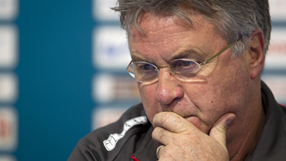Hiddink exits Turkey after play-off failure
Guus Hiddink's contract as Turkey coach has been terminated by mutual consent following the team's failure to reach the Euro 2012 finals, the Turkish Football Federation said on Wednesday, ending a disappointing spell in charge for the Dutchman.

The decision, announced on the federation's website, had been expected after Tuesday's 0-0 draw in Croatia which completed Turkey's 3-0 aggregate defeat in their play-off.
Even before the play-offs, Hiddink had been under fire in the Turkish media for failing to inspire a team which reached the semi-finals of Euro 2008 after defeating Croatia in the quarter-finals.
"Following the meeting between the Turkish Football Federation executive committee and Turkey head coach Guus Hiddink, the Dutch coach's contract has been terminated by mutual consent," the federation said.
"We would like to thank Mr. Guus Hiddink for his services during his working period, and wish him all the best in his future career," it added, saying it would announce developments regarding a new coach in the coming days.
In February last year Hiddink agreed a four-year contract, with the final two years optional, but Turkey's performances under him caused widespread disappointment.
After the first leg against Croatia, Atletico Madrid forward Arda Turan lambasted Hiddink's tactics in the Turkish media, saying they invited defeat and accusing Hiddink of being too timid and not believing in his players.
Hiddink told reporters the lack of support and opportunities for young players at clubs lay at the heart of Turkey's inconsistency on the big stage and their failure to reach Euro 2012.
Get FourFourTwo Newsletter
The best features, fun and footballing quizzes, straight to your inbox every week.
Hiddink, whose coaching career has included spells in charge of the Netherlands, Australia, South Korea and Russia, has previously been linked with a move to Chelsea, where he had a good relationship with the Premier League club's billionaire Russian owner Roman Abramovich.
He criticised an "inefficient system" depriving young players of a chance to develop.
"All national teams representing a country, starting with the under-14 side up to the senior level, depend on how the clubs are organised and how seriously they take the education of young players from the age of 10," Dutchman Hiddink told reporters.
"In countries like Germany and Holland, this system is highly developed and the results are obvious.
"Holland is a small country but the national team is always in the big tournaments, with the solitary exception of the 2002 World Cup, because young players are getting a lot of chances to play for their clubs and are well educated.
"On the other hand, only one or two players from Turkey's under-19 and under-21 sides have come through to senior level and while in those countries it's a reliable process, in Turkey it's an exception.
"Turkey has a lot of potential but will only take part in big tournaments more frequently if the system is organised in a better way, because the foundation must lie in the clubs and be 100 percent efficient."
PAINFUL TRANSITION
Having reached the Euro 2008 semi-finals as the tournament's underdogs after a dramatic penalty shootout win over Croatia, the Turks first got a rude awakening when they failed to reach last year's Wor
